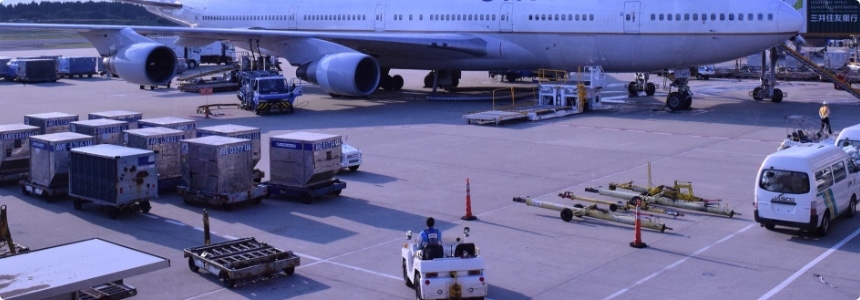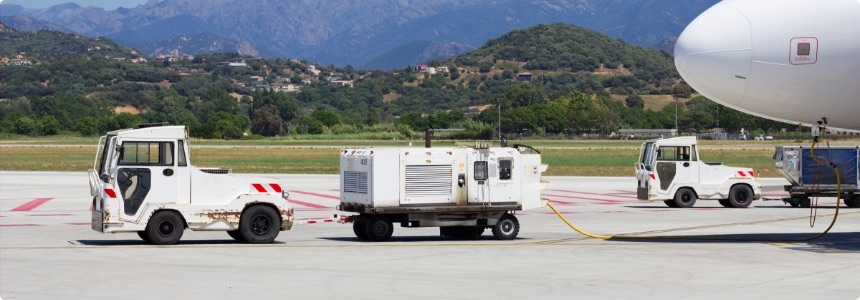What Is Big Data?
Big data is, in simple terms, a massive collection of raw data that is most often gathered through equipment sensors. The onboard diagnostic systems then provide real-time data about a vehicle's health. Usable metrics often include aspects like speed, rapid deceleration, hard cornering and braking.
While the concept of onboard diagnostics is nothing new, it is something that the aviation ground support equipment industry is utilizing more and more as a strategy to gain actionable intelligence regarding GSE health. Big data and knowledge management aren't important due to the amount of data they provide, but because of what can be done with it. Big data programs, such as EBIS Aviation Software, can aid in company development and growth, cost reductions, time reductions and overall intelligent decision-making.
What Sets Big Data Management Apart From Analytics?
It may seem on the surface that big data is synonymous with analytics. However, big data is used to gather unstructured data, whereas data analytics is typically more focused, having a goal in mind to look for ways to gain support. When combined with analytics, proper big data management makes it simpler to determine the root cause of failures, issues and defects to aid with ground support equipment maintenance. There are three core measurements that big data can pull from a vehicle's raw data:
- 1. Velocity: This is the speed of data creation. Real-time information allows a company or organization to be more agile than competitors.
- 2. Volume: This is the sheer amount of data that is created each day. This will enable companies to work with multiple petabytes (one petabyte equals one quadrillion bytes) in a single data set.
- 3. Variety: Big data provides information from numerous sources. It uses readings from sensors, GPS signals from cellphones, smartphones, messages, updates, images and more to glean information about GSE health.
How Big Data Can Improve Ground Support Equipment Maintenance
Big data management for towbarless tugs, Bobtail tractors and other GSE has many benefits for overall GSE health. In the GSE industry, minute changes and adjustments can equate to massive gains across a fleet. The following are just a few examples of how big data and knowledge management can improve overall aviation ground support equipment maintenance:
- Predetermining an indicator of breakage or areas of failure or weakness can save hours of downtime and additional costs.
- More accurate mean times between system failures from actual fleet data can result in shorter times between repairs and/or overhauls.
- If using the same GSE in various locations, broad trends can be tracked over different time periods. Companies can compare statistical trends like efficiency and overall wear in different environments.
Implementation Factors To Consider When Using Big Data Management
Properly using big data and another regular maintenance analysis program can provide incredibly valuable information over time for GSE, like an electric airplane tug or a towbarless tractor. But big data is virtually useless if the information is not used thoroughly and correctly. The following are a few things to consider prior to implementing big data management for GSE health.
1. Big Data Management Can Be Expensive
Big data is expected to grow exponentially in popularity over the next few years. But as of now, the technology used to process the data is expensive. This cost is likely due to the specialized servers, databases and other types of software that are required. As big data management becomes more and more mainstream, the cost to add it will naturally come down.
2. Hiring and Training Staff Is Crucial
One of the costliest components of big data is the personnel and training that it requires. To use big data and knowledge management as intended, airports must train their current staff or hire newly trained staff.
3. Big Data Is an Investment
It's going to take time, money and expertise to get a big data management program up and running. Implementing and sustaining big data is expensive. But once a company knows how to properly use it and transpose it into actionable information for operations, it can prove invaluable.
4. Not All Fleets Are a Good Fit
Remember that big data management is meant to be used when evaluating a fleet of vehicles and equipment to better understand the fleet's health and preparedness. Not all fleets are a good fit for big data. If a company has just a few similar items at one centralized location, big data typically won't provide the value they desire.
This article is a high-level explanation of big data management and how it relates to the GSE industry. Understand that big data is a complex and multi-layered concept that can sometimes be difficult to quantify. But it has been successful in the predictive analysis of various fleets of equipment. Implementing big data into your operations is just another way you can improve ground handling and overall GSE health.
Incorporate Big Data Management In Your Fleet With Help From Eagle Tugs
At Eagle Tugs, our mission has always been to provide customers with high-quality GSE that is cutting-edge, safe and reliable. And with our EBIS GSE Cloud Solution Software, you'll be able to use big data management to increase productivity, streamline GSE health and stay on top of work orders. Be sure to browse our selection of aircraft towing equipment and towbarless tugs to ensure your fleet runs at peak efficiency. Have a question or need additional information about any of our product lines? Reach out to one of our knowledgeable Eagle Tugs representatives today.
Request a Quote TodayRelated Articles: What Is Big Data?
 How To Maximize Cost Savings and Make the Most of an Airport Ground Support Equipment Fleet Operating, maintaining and repairing an airport ground support equipment (GSE) fleet can be expensive. But by streamlining and maximizing the efficiency of ground handling...
How To Maximize Cost Savings and Make the Most of an Airport Ground Support Equipment Fleet Operating, maintaining and repairing an airport ground support equipment (GSE) fleet can be expensive. But by streamlining and maximizing the efficiency of ground handling...  Things to Consider When Creating a Replacement Plan for Your Airport Ground Support Equipment When a vital component of your airport ground support equipment (GSE) fleet dies, it can throw a real wrench into your overall efficiency and productivity. Instead, establish a plan for regular updates...
Things to Consider When Creating a Replacement Plan for Your Airport Ground Support Equipment When a vital component of your airport ground support equipment (GSE) fleet dies, it can throw a real wrench into your overall efficiency and productivity. Instead, establish a plan for regular updates...  How to Manage Ground Handling Operations & GSE With Fleet Telematics Fleet telematics systems have revolutionized both the ground handling industry and the flightline as we know it by helping ground handlers and ground handling equipment suppliers cut costs and further enhance...
How to Manage Ground Handling Operations & GSE With Fleet Telematics Fleet telematics systems have revolutionized both the ground handling industry and the flightline as we know it by helping ground handlers and ground handling equipment suppliers cut costs and further enhance... 


